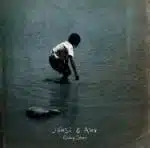
Riceboy Sleeps is the original moniker under which all the creative work falls in the collaboration between Jón (Jonsi) Pór Bergisson, singer and fundamental figure in Icelandic post-rock band Sigur Ros, and Alex Somers, who does much of the artwork for his partner’s full-time project, and is also the founding member of the American/Icelandic eight-piece, Parachutes.
The pair started on the Riceboy Projects in 2003, working together on and off for nearly six years. The first publicly available work was a wordless art book released in 2006, before three exhibitions in 2007 using unfinished compositions taken from the album alongside visual pieces of video and imagery. It was only in February of this year that the pair saw it best to begin taking the music that they had written more seriously, subsequently leaving to record the tracks on a remote, solar-powered commune in Hawaii.
On first listen, many may feel there is little significant difference between Riceboy Sleeps and Sigur Ros circa Hvarf/Hvam; however, if you don’t pay attention, Riceboy‘s perfection can pass you by. Turn it up loud and the beauty the record presents really hits with full force. All Ros’ rock based structure and Parachutes pop sensibilities make way for a more free, less structured orchestral composition of time and space, exposing an experiment of lush ambient soundscapes along the likes of Brian Eno, seemingly switching the generative music premise of “theory before practice” for practice before theory.
“Atlas Song” uses rich layers of string and piano before the first washing choral textures of the Kópavogsdætur Choir, used for recording across the album, drift in, overlaid with rich textures of ambient echo. The wordless vocals are reminiscent of a stripped back James Horner score and the track creeps up building until the verge of distortion to a crescendo that gives the first signal of the record being a form more than mere backing music.
“Indian Summer” gives introduction to the familiar Sigur Ros piano stylings, with an off kilter key balanced with a stream of subtle wandering piano strokes, over those textured layers of string again, all provided by the Icelandic string quartet and long serving Sigur Ros collaborators Amiina. The close of the track gives home to the only presence of Jonsi’s vocal throughout, with the stunning cameo affirming, if remotely necessary, his ability as more than merely the singer in both the Riceboy works and his full time project. As the vocal echoes off the feeling of distance from the music present throughout the record is at its most prominent. The track was originally recorded in two parts, and the huge swathes of silence in the transition between these, split into a piano and string section, demonstrates the confident lack of urgency in any of the music across the record.
Riceboy Sleeps is clever as it introduces elements into its compositions before focusing upon them later, creating a consistent development throughout, with no introduction, body and conclusion, but rather a journey from A to B, as start to finish. The focus on the piano introduced in “Indian Summer” comes on “Boy 1904”, where its delicate strokes really begin to take flight, returning with the echoing choral whirls creating a harmony that climaxes in one of the most awe inspiring crescendos on the record. Featuring the last known Castrato recording the track is like listening to the soundtrack of a beautiful dream or memory, floating along in the content world these can present.
“Daniell in the Sky” gives the haunting waves of the Kópavogsdætur Choir their stand-alone moment before “Howl” utilises Amiina’s lush strings, building these alongside the wordless choral washes to give the record its final crescendo. The use of distorted recordings of river frogs as the track closes ties closely back to the solitude the pair have captured across the album from the remote location it was recorded in.
At times introspective, often breathtaking, and at no stage executed in any other way than meticulous perfection, to the patient listener Riceboy Sleeps is a masterpiece of generative ambience. And yet, because of its lack of obvious presence, it will most likely never be considered as such. The record has a contradictory way of leaving the listener wholly fulfilled yet desperate for more, a more that may only be fulfilled by the pair taking to the stage in a performance of Riceboy alongside the beautiful Amiina and haunting vocals of the Kópavogsdætur Choir.

